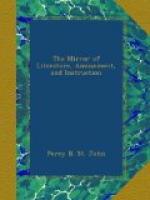I have your money—here’s
a kiss,
I will be true to you,
But one word more, “adieu”
it is,
Cries Jack, it is a do.
MAY.
* * * * *
BARDS, OR POETS OF THE ANCIENT BRITONS.
(For the Mirror.)
Hail! to the Bards, who sweetly sung
The praises of dead peers
In lofty strains, thus to prolong
Their fame for many years.
LUCAN.
This sect appears to have descended from Bardus, son of Druis, king of Britain; he was much esteemed by the people for inventing songs and music, in praise of meritorious actions; and established an order, in which such of the people were admitted as excelled in his art, distinguishing them by the name of bards, after his own name. Julius Caesar reports, that on his arrival he found some of them. Their business was to record the noble exploits of their warriors in songs and ditties, which they sung to their instruments at the solemn feasts of their chiefs; and in such high estimation were they held, that, when two armies were ready to engage, if a bard stept in between them, both sides delayed the attack till he was out of danger.
As these bards were neither repugnant to the Roman authority nor the Christian religion, they alone, above all other sects, were suffered to continue long after the birth of Christ; and it is said that some of them are still to be found in the isle of Bardsey, (so named from them). Wisbech. T.C.
* * * * *
THE SCOTTISH PEASANT’S LAMENT.
BY THE AUTHOR OF AHAB.
(For the Mirror.)
Oh! had I my home by the side of the glen,
In a spot far remote from the dwellings
of men,
Wi’ my ain bonnie Jeannie to sit
by my side,
I’d nae envy auld Reekie her splendor
and pride.
The song of the mavis should wake me at
morn,
And the grey breasted lintie reply from
the thorn;
While the clear brook should run in the
sun’s yellow beam,
And my days glide as calmly along as its
stream.
But here, in the city’s dull streets,
I must live,
Nae Jeannie her arms for my pillow to
give;
Nae mavis, nae lintie, to sing from the
tree,
Nae streamlet to murmur its music to me.
O better, by far, had I never been born,
Or my head laid in rest in the glen ’neath
the thorn;
Since the songs of my birds I no longer
can hear,
Nor in slumber recline by the side of
my dear.
Now, all that makes life still endured,
is the dream,
That comes o’er my soul, of the
bird and the stream;
And the love of my Jean—when
that vision shall close,
In the silence of death let my ashes repose.
Yet then, even then, my sad spirit will
be,
By the side of the brook, ’neath
the shade of the tree;
In the arms of my Jeannie, for ne’er
can it stay,
From those who in life had endeared it
away.




